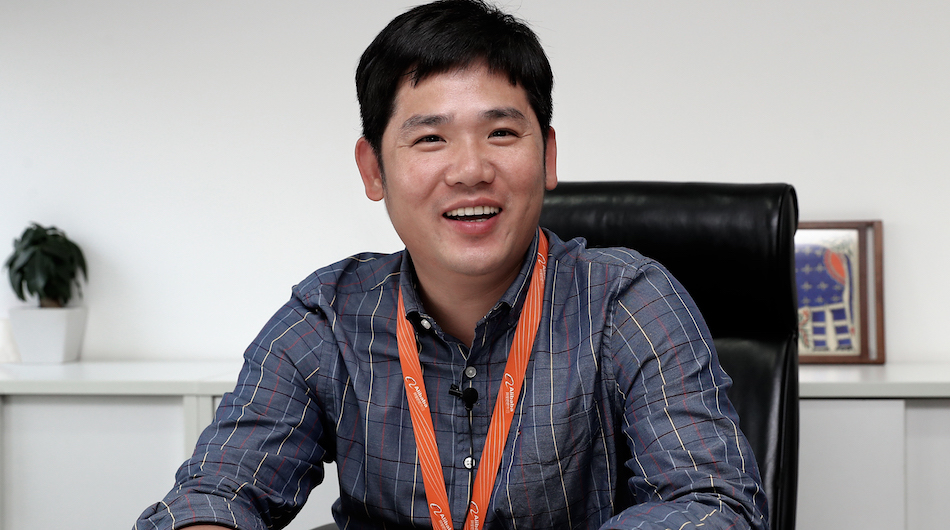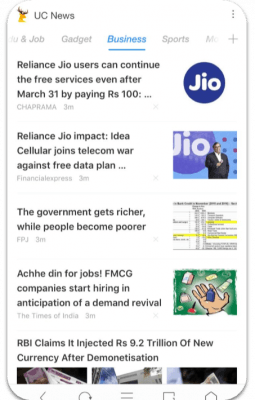
Jack Huang, president of overseas business, Alibaba Mobile Business Group. Photo credit: UCWeb
Last week, Alibaba-owned UCWeb announced a US$30-million investment to develop a content business around the UC Browser in India and Indonesia. This is just the start of a much bigger commitment to its two most important markets outside China in 2017, Jack Huang, president of the Alibaba Mobile Business Group, later explained.
The recommendation model is booming right now and will continue to do so in the near future.
What’s more interesting than the money invested is the UCWeb content strategy. The Alibaba-owned company believes it has both the user base and market savvy in Asia to beat Google and Facebook at their own game of building a content ecosystem that drives their ad businesses.
In an interview with Tech in Asia at the UCWeb headquarters in Guangzhou, Jack Huang spelled out the game plan in no uncertain terms.
“Our user volume is a key factor. We’re not far behind Google and Facebook (in Asia), and we’re growing really fast,” points out the stocky and energetic Huang, in a small, sparsely furnished room at one corner of the tenth floor of a building that houses thousands of UCWeb employees, including teams from India, Indonesia, and Russia.
The millions driving its bet
UCWeb claims to have 420 million monthly active users, out of which more than 100 million are in India. To put that into perspective, Facebook claims to have 155 million monthly active users in India.
The race is closer or even in UCWeb’s favor when it comes to mobile, which accounts for over two-thirds of internet traffic in India. The UC Browser is already the most popular mobile browser in India and neck-and-neck with Google Chrome in Indonesia, according to StatCounter. The use of compression technology to speed up browsing and minimize data usage, keeping in mind the poor connectivity and the frugality in India, has worked wonders for the browser.
Now the idea is to build a content ecosystem around it, which can then be monetized. That’s not unlike the personalized Facebook news feed or Google user data being used for targeted advertising. But the prerequisite is to have an ecosystem that hooks lots of users to spend time there.
“We should learn more from Google and Facebook how they do this,” Huang tells me candidly. But UCWeb has a few aces of its own, too.
A personalized engine to engage users
Last year, UCWeb launched UC News in India and Indonesia. Initially, it aggregated content from traditional media, and integrated it with the UC Browser. But this soon broadened into a self-publishing program called We-Media to have diverse user-generated content, including video. What’s more, self-publishers can get paid according to the traction they get for their articles, images, and videos.

Most user-generated content platforms with large distribution networks expect their users to be happy with the intangible benefits of getting visibility, building a reputation, and gaining a following. So UCWeb is taking a different line here to incentivize publishing with payment on top of providing access to its massive user base. The bet is this will help ramp up UC News faster in India and Indonesia, its two main markets outside China.
But ramping up is one part of it; UCWeb also wants to ensure its users stay engaged. For that, it is pooling Alibaba tech resources to build a personalization engine powered by big data and artificial intelligence (AI).
We have fierce competition, a lot of use cases, and good innovation.
While AI is the current buzz among all the global tech giants, Huang believes UC News has the advantage of having a recommendation-based content model from the very outset. Google, for instance, has a search-based model at its core. And on platforms like YouTube and Facebook, you essentially subscribe to what you want to see.
“The recommendation model is booming right now and will continue to do so in the near future,” says Huang. “It has the most potential because it’s new and catching up with other business models. We can see successful products in China based on the recommendation model that are making money and growing faster than other kinds of products.”
See: Hopes and fears over AI alliance of Google, Microsoft, Amazon, Facebook, IBM
Indian requirements

Indian youth is all about mobile phones and internet. Photo credit: BollywoodBubble.
Recommendations for content consumers and payments for user-generated longtail content: UCWeb hopes these will work in tandem to win the Indian and Indonesian markets, riding on the popularity of its browser. Kenny Ye, GM for global markets at Alibaba Mobile Business Group, says the key to this is to adapt to local users’ requirements.
“UCWeb has the experience of playing in the world’s largest mobile internet market in China. We have fierce competition, a lot of use cases, and good innovation,” says Ye. Now to adapt that understanding of mobile internet user behavior to the world’s fastest growing smartphone market, India.
UC News is available in Hindi, and support for other Indian languages will follow soon, as UCWeb builds up its content team in India. Dailyhunt, India’s leading app for news and other content in local languages, also has a Chinese backer, ByteDance. But UCWeb’s plan to build a content ecosystem around its browser is a much bigger play than a news app.
One article says Jio will cancel the plan in March, another one says it will continue. The machine can help us pick the credible source.
At its heart is the AI it can build on data from its massive mobile internet user base. The first time a user opens UC News, she picks tags like entertainment. Then the self-learning AI engine kicks in, explains Young Li, product head for UC News. “Is it Shahrukh Khan she’s interested in or Shahrukh Khan movies?” he quips in Chinese, which is translated to me. “The longer you use UC News, the better it will understand your interests.”
So how good is it right now at understanding starry-eyed Indian users? How much data will UC News need to crack it and how long will that take?
“AI is a dynamic process, but in practical terms there is no benchmark on how much data leads to more correct results. We believe that UCWeb’s huge user base already gives us that capability,” says Li.
The capability can be extended to identifying and blocking inappropriate content. For example, the machine can screen for copyright issues or sensitive words related to religion, adds Bruce Zuo, head of content and media for UC News. It also cross-checks news with other sources.
Zuo, for instance, is bemused by the contrary claims on the Reliance Jio telecom data plan doing the rounds in India. “One article says Jio will cancel the plan in March, another one says it will continue. The machine can help us pick the more credible source.”
See: Half the work people do can be automated: McKinsey
Global fight on local turf
We live in interesting times indeed when a Chinese company recommends content to Indian consumers. I point out to Huang the irony in UCWeb getting a free hand to do this in India, whereas the likes of Facebook and Google are blocked in China.
Not surprisingly, he doesn’t want to be drawn into a comment on a Chinese government decision. But he does point out to me another way of looking at it: “Instead of competing with global companies in China, we’re competing with them in India which is an open market.”
That’s an intriguing prospect right now in the context of Donald Trump’s China-bashing in the lead-up to his election as US President. But it’s also a new narrative from the usual one of Chinese companies winning over global competitors in a protected market at home. We may start seeing wins on neutral ground.
See: China’s fintech industry shows where the rest of the world is heading
For Indian tech entrepreneurs and consumers, this could well be a time of learning and gaining from the best of both worlds. Chinese smartphones and utility apps have stormed the Indian market in the past couple of years. Now, we could see the next wave of Chinese-style entrepreneurialism disrupting businesses in broader domains.
This post Inside Alibaba-owned UCWeb’s plan to outwit Google and Facebook in Asia appeared first on Tech in Asia.
from Tech in Asia https://www.techinasia.com/alibabas-ucweb-gameplan-outwit-google-facebook-asian-markets
via IFTTT
No comments:
Post a Comment